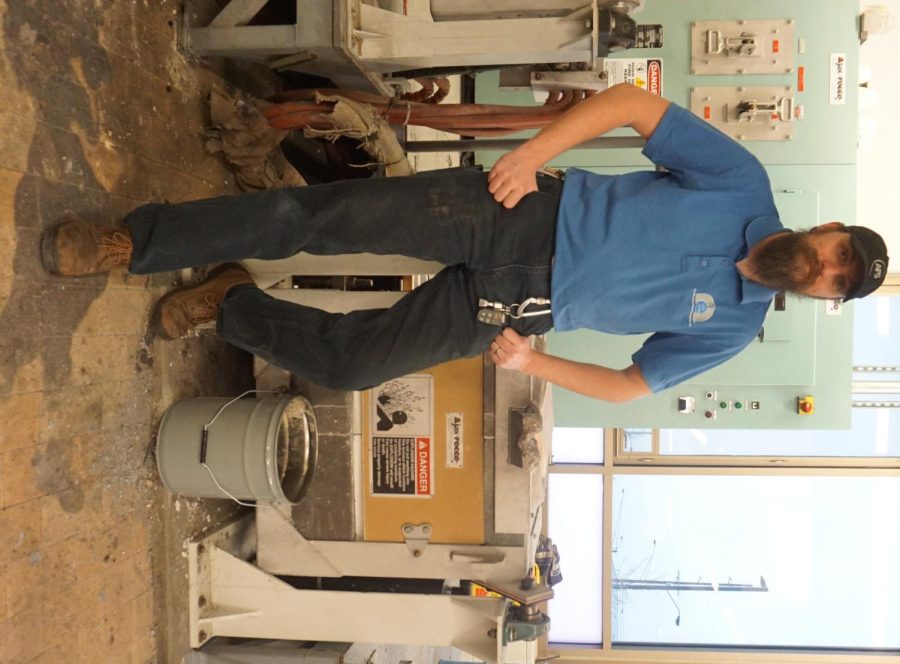Foundry professor discusses teaching, advising students
February 10, 2020
Trent True watched closely as the oven-sized furnace slowly tipped and released an orange flow of molten silica bronze. The 2,350 degree Fahrenheit metal cascaded into a massive ladle, held by two students dressed head-to-toe in aluminized suits and protective helmets. The metal burst into flame as it made contact with four freshly made sand casting molds and left the ladle brightly glowing. This is a common process in the laboratory where True spends much of his time.
True is a lecturer and Foundry Educational Foundation [FEF] key professor in Kent State University’s College of Aeronautics and Engineering [CAE]. He is also the faculty advisor for Kent’s student chapter of American Foundry Society [AFS] and head of the Foundry Tech program, accredited by the Foundry Educational Foundation, which awards thousands of dollars in scholarships to metalcasting students each year.
After graduating high school in 1995, True joined the army as a combat engineer, continuing a family tradition of military service. He served two tours in Bosnia and continues to use his leadership skills and ability to project his voice in his job as a professor.
“Yeah, that’s something they teach in the military. And, you know, working in a shop environment like we work in here, it’s good to be able to make yourself loud enough to be heard over the chaos of what’s going on,” True said.
Upon retiring from the military, True enrolled at Kent State, where he graduated with his bachelor’s of science in technology in 2005 and master’s of technology in 2007. True knew he wanted to be a teacher since he was in high school and trained many new employees in the foundry industry, where he worked as a process engineer following his graduation from university.
“There’s an adage that knowledge is power. I am a firm believer in that, and I am a firm believer that the way you make your employees powerful is not by hoarding or storing knowledge away from those people, but by sharing it,” True said.
True teaches foundry skills in the CAE’s foundry laboratory. True teaches materials and processes, manufacturing technology, cast metals, solid modeling and solidification and foundry tooling and pattern-making.
On top of his job as a professor, True is the faculty advisor for the Kent State student chapter of American Foundry Society. AFS is a professional trade organization for the foundry industry. FEF started in 1947 to expand and support the foundry industry.
“[FEF] knew the only way the foundry industry was going to thrive and survive was if they can continually get high quality talent into their [metal casting facilities] so one way that they felt they could do that was by working with colleges … so the students got exposed to it before they came into the workforce,” True said. FEF provides scholarship money to encourage interest in the industry.
Kent State’s student chapter of AFS works to produce “Foundry In a Box,” which are mobile teaching kits. These kits provide an introduction to the metal casting industry and are sold to high schools, universities, businesses and Boy Scout troops.
“When it comes to liquid metal, people tend to have one of two reactions. They either like it a lot, think it’s really cool and they go towards it or they’re like, ‘That ain’t right’ and they back away. We like the first type here,” True said.
AFS provides students an opportunity to be introduced to the foundry industry, work with liquid metal and to be around like-minded people. Members of the organization are awarded annual scholarships to encourage their interest in the industry.
Members also attend monthly professional chapter dinners, where they have a chance to meet local industry contacts. In December, scholarships are awarded by the AFS professional chapter. They also attend the yearly CastExpo, where they can get further educated on the industry, get to see full-size industrial equipment and network with foundry companies and suppliers from around the United States.
“When a student does graduate … they can reach out and say, ‘Hey, you know, I’m looking for a job and graduating soon’ and these companies know because they’ve met the students through AFS events. The students are knowledgeable and involved and have a passion for the industry,” True said.
Being able to educate students on the foundry industry and introduce them to a wide variety of opportunities to further their careers makes True feel like he has found his dream job.
“I’m a very firm believer in the adage of ‘If you love what you do, you’ll never work a day in your life.’ … I probably only work about two days a week here. … I really enjoy what I do,” he said.
Michael Reed is a general assignment reporter. Contact him at [email protected].

























